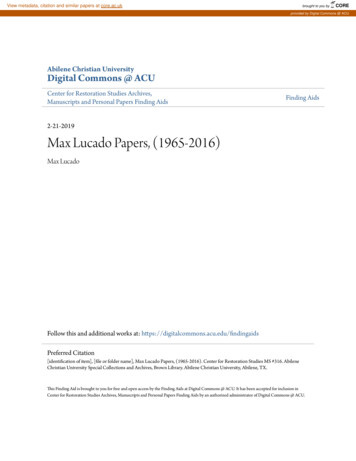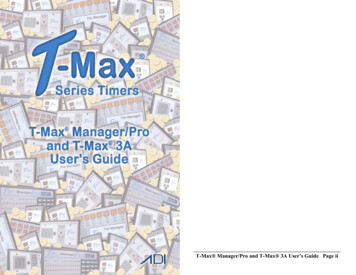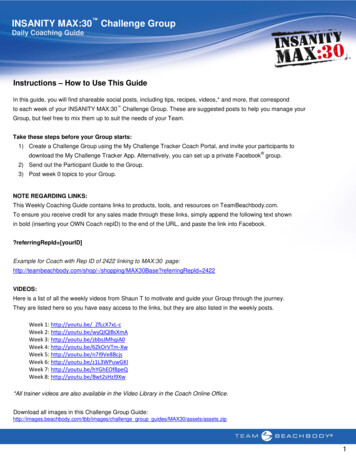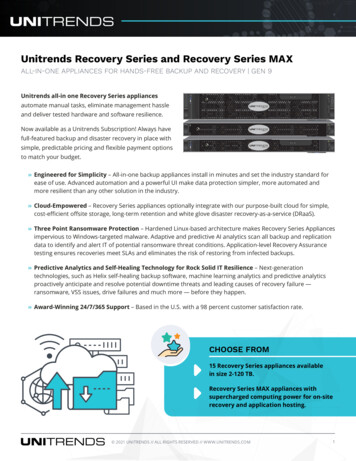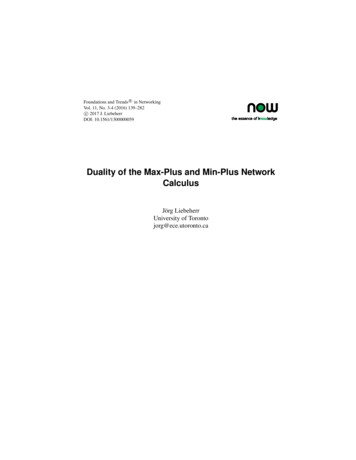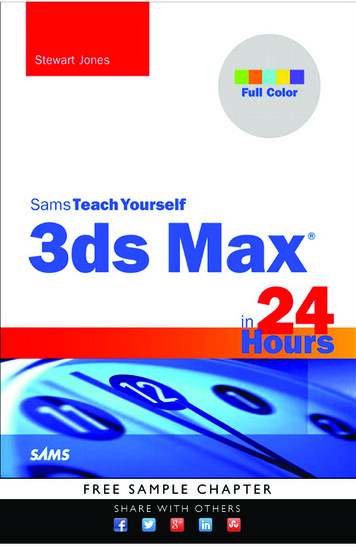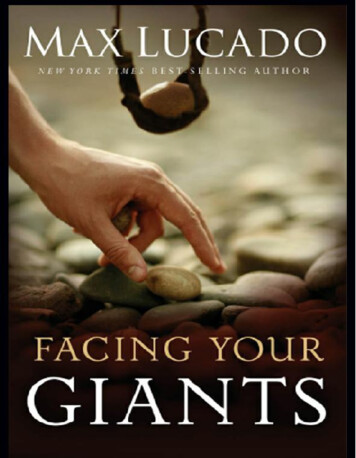
Transcription
2006 Max LucadoAll rights reserved. No portion of this book may bereproduced, stored in a retrieval system, or transmitted in anyform or by any means—electronic, mechanical, photocopy,recording, scanning, or other—except for brief quotations incritical reviews or articles, without the prior written permissionof the publisher.Published in Nashville, Tennessee, by Thomas Nelson.Thomas Nelson is a trademark of Thomas Nelson, Inc.Thomas Nelson, Inc. titles may be purchased in bulk foreducational, business, fund-raising, or sales promotionaluse. For information, please e-mailSpecialMarkets@ThomasNelson.com.All Scripture quotations, unless otherwise indicated, aretaken from the New King James Version, copyright 1979,1980, 1982, Thomas Nelson, Inc., Publishers.Other Scripture references are from the following sources:The American Standard Version (ASV). God’s Word (God’sWord) is a copyrighted work of God’s Word to the NationsBible Society. Quotations are used by permission. Copyright1995 by God’s Word to the Nations Bible Society. All rightsreserved. The Good News Bible: The Bible in Today’s EnglishVersion (TEV) copyright 1992 by the American Bible Society.The King James Version of the Bible (KJV). The Living Bible(TLB), copyright 1971 by Tyndale House Publishers,Wheaton, Ill. Used by permission. The Message (MSG),
copyright 1993. Used by permission of NavPressPublishing Group. New American Standard Bible (NASB), 1960, 1977, 1995 by the Lockman Foundation. The NewCentury Version (NCV), 2005 by Thomas Nelson, Inc.Used by permission. All rights reserved. The Holy Bible, NewInternational Version (NIV). Copyright 1973, 1978, 1984,International Bible Society. Used by permission of ZondervanBible Publishers. Holy Bible, New Living Translation (NLT),copyright 1996. Used by permission of Tyndale HousePublishers, Inc., Wheaton, Illinois 60189. All rights reserved.The New Revised Standard Version Bible (NRSV), 1989 bythe Division of Christian Education of the National Council ofthe Churches of Christ in the USA. J. B. Phillips: The NewTestament in Modern English, Revised Edition (PHILLIPS).Copyright J. B. Phillips 1958, 1960, 1972. Used bypermission of Macmillan Publishing Co., Inc.Library of Congress Cataloging-in-Publication DataLucado, Max.Facing your giants / Max Lucado.p. cm.Includes bibliographical references and index.ISBN 978-0-8499-0181-2ISBN 978-0-8499-9149-3 (International Edition)ISBN 978-0-8811-3350-9 (Spanish Edition)
1. David, King of Israel. 2. Goliath (Biblical giant) 3. Christianlife. 4. Spirituality. I. Title.BS580.D3L83 2006222'.4092—dc222006019176Printed in the United States of America07 08 09 10 11 RRD 8 7 6 5 4
Denalyn and I gladly dedicate thisvolume toRod and Tina Chisholm—faithful, dependable, and joyful servants.We thank God for more than twodecades of friendship.
ALSO BY MAX LUCADOINSPIRATIONALA Gentle ThunderA Love Worth GivingAnd the Angels Were SilentCome ThirstyCure for the Common LifeGod Came NearHe Chose the NailsHe Still Moves StonesIn the Eye of the StormIn the Grip of Grace
It’s Not about MeJust Like JesusNext Door SaviorNo Wonder They Call Him the SaviorOn the AnvilSix Hours One FridayThe Applause of HeavenThe Great House of GodTraveling LightWhen Christ ComesWhen God Whispers Your NameCHILDREN’S BOOKSA Hat for Ivan
Alabaster’s SongAll You Ever NeedBecause I Love YouBest of AllHe Chose YouHermie, a Common CaterpillarIf Only I Had a Green NoseJacob’s GiftJust in Case You Ever WonderJust Like Jesus (for teens)Just the Way You AreNext Door Savior (for teens)Punchinello and the Most Marvelous Gift
Small Gifts in God’s HandsStanley the StinkbagTell Me the SecretsTell Me the Story The Crippled LambThe Way HomeWith You All the Way You Are MineYou Are Special Your Special GiftGIFT BOOKSA Heart Like JesusEveryday BlessingsFor These Tough Times God’s MirrorGod’s Promises for YouGod Thinks You’re Wonderful
Grace for the Moment, Vol. I & IIGrace for the Moment JournalIn the Beginning Just for YouJust Like Jesus Devotional Let theJourney BeginMocha with MaxOne Incredible Moment Safe in theShepherd’s ArmsShaped by God The CrossThe Gift for All PeopleThe Greatest Moments Traveling Lightfor MothersTurnFICTION
An Angel’s Story The Christmas CandleThe Christmas ChildBIBLES (GENERAL EDITOR)He Did This Just for You (NewTestament)The Devotional BibleGrace for the Moment Daily Bible
CONTENTSAcknowledgments1 Facing Your Giants2 Silent Phones3 Raging Sauls4 Desperate Days5 Dry Seasons6 Grief-Givers7 Barbaric Behavior8 Slump Guns9 Plopping Points10 Unspeakable Grief
11 Blind Intersections12 Strongholds13 Distant Deity14 Tough Promises15 Thin Air-ogance16 Colossal Collapses17 Family Matters18 Dashed Hopes19 Take Goliath Down!Afterword: What Began in BethlehemStudy GuideNotes
ACKNOWLEDGMENTSThe list of people who midwifed this book islong. Each deserves a standing ovation andearly retirement.Editors Liz Heaney and Karen Hill. When itcomes to prompting thick-headed authors, youwrote the book.Steve and Cheryl Green. If the country hadoverseers like you, we’d all sleep better. Thankyou for your million and one acts of service.David Moberg and the W team. The higheststandard of publishing.Susan Ligon. Your devotion to detail isexceeded only by your devotion to Christ. I’mgrateful.Sam Moore, Mike Hyatt, and the ThomasNelson family. If a better team exists, I’ve not
seen it.The Oak Hills ministers, staff, and elders. Mayyou continue to be a home for every heart.The UpWords family of Becky, Margaret, andTina. What gifts you have and gifts you are!Eugene Peterson. Each reading of your bookstouches me. Leap Over a Wall changed me.Where my words sound too much like yours,forgive me—you get the credit.Carol Bartley. Scotland Yard should have sucha sleuth. I stand in awe of your editorial skills.Steve Halliday. Thanks for another insightfulStudy Guide.David Treat. Your prayers winged these wordsto heaven.My three daughters, Jenna, Andrea, and Sara.Every day more beautiful. Every day more godly.
And to Denalyn. If there’s a law limiting ahusband’s love for his wife, you’ll have to visit mein prison. After twenty-five years, I’m stillstarstruck by you.
As Goliath moved closer to attack,David quickly ran out to meet him.—1 Samuel 17:48 (NLT)
1FACING YOUR GIANTSTHE SLENDER, beardless boy kneels by thebrook. Mud moistens his knees. Bubbling watercools his hand. Were he to T notice, he couldstudy his handsome features in the water. Hairthe color of copper. Tanned, sanguine skin andeyes that steal the breath of Hebrew maidens.He searches not for his reflection, however, butfor rocks. Stones. Smooth stones. The kind thatstack neatly in a shepherd’s pouch, rest flushagainst a shepherd’s leather sling. Flat rocksthat balance heavy on the palm and missile withcomet-crashing force into the head of a lion, abear, or, in this case, a giant.Goliath stares down from the hillside. Onlydisbelief keeps him from laughing. He and hisPhilistine herd have rendered their half of the
valley into a forest of spears; a growling,bloodthirsty gang of hoodlums boasting do-rags,BO, and barbed-wire tattoos. Goliath towersabove them all: nine feet, nine inches tall in hisstocking feet, wearing 125 pounds of armor, andsnarling like the main contender at the WorldWide Wrestling Federation championship night.He wears a size-20 collar, a 101/2 hat, and a 56inch belt. His biceps burst, thigh muscles ripple,and boasts belch through the canyon. “This day Idefy the ranks of Israel! Give me a man and letus fight each other” (1 Sam. 17:10 NIV). Who willgo mano a mano conmigo? Give me your bestshot.No Hebrew volunteers. Until today. Until David.David just showed up this morning. Heclocked out of sheep watching to deliver breadand cheese to his brothers on the battle-front.That’s where David hears Goliath defying God,and that’s when David makes his decision. Thenhe takes his staff in his hand, and he chooses for
himself five smooth stones from the brook andputs them in a shepherd’s bag, in a pouch thathe has, and his sling is in his hand. And hedraws near to the Philistine (17:40).1Goliath scoffs at the kid, nicknames himTwiggy. “Am I a dog, that you come to me withsticks?” (17:43 NASB). Skinny, scrawny David.Bulky, brutish Goliath. The toothpick versus thetornado. The minibike attacking the eighteenwheeler. The toy poodle taking on the rottweiler.What odds do you give David against his giant?Better odds, perhaps, than you give yourselfagainst yours.Your Goliath doesn’t carry sword or shield; hebrandishesbladesofunemployment,abandonment, sexual abuse, or depression.Your giant doesn’t parade up and down the hillsof Elah; he prances through your office, yourbedroom, your classroom. He brings bills youcan’t pay, grades you can’t make, people you
can’t please, whiskey you can’t resist,pornography you can’t refuse, a career you can’tescape, a past you can’t shake, and a future youcan’t face.You know well the roar of Goliath.David faced one who foghorned hischallenges morning and night. “For forty days,twice a day, morning and evening, the Philis-tinegiant strutted in front of the Israelite army” (17:16NLT). Yours does the same. First thought of themorning, last worry of the night—your Goliathdominates your day and infiltrates your joy.How long has he stalked you? Goliath’s familywas an ancient foeFirst thought of the morning, last worry of the night—your Goliath dominates your day, and infiltrates your joy.of the Israelites. Joshua drove them out of thePromised Land three hundred years earlier. He
destroyed everyone except the residents of threecities: Gaza, Gath, and Ashdod. Gath bredgiants like Yosemite grows sequoias. Guesswhere Goliath was raised. See the G on his letterjacket? Gath High School. His ancestors were toHebrews what pirates were to Her Majesty’snavy.Saul’s soldiers saw Goliath and mumbled,“Not again. My dad fought his dad. My granddadfought his granddad.”You’ve groaned similar words. “I’m becominga workaholic, just like my father.” “Divorcestreaks through our family tree like oak wilt.” “Mymom couldn’t keep a friend either. Is this evergoing to stop?”Goliath: the long-standing bully of the valley.Tougher than a two-dollar steak. More snarlsthan twin Dobermans. He awaits you in themorning, torments you at night. He stalked yourancestors and now looms over you. He blocks
the sun and leaves you standing in the shadow ofa doubt. “When Saul and his troops heard thePhilistine’s challenge, they were terrified and lostall hope” (17:11 MSG).But what am I telling you? You know Goliath.You recognize his walk and wince at his talk.You’ve seen your Godzilla. The question is, is heall you see? You know his voice—but is it all youhear? DavidYou’ve seen your Godzilla.The question is, is he all you see?saw and heard more. Read the first words hespoke, not just in the battle, but in the Bible:“David asked the men standing near him, ‘Whatwill be done for the man who kills this Philistineand removes this disgrace from Israel? Who isthis uncircumcised Philistine that he should defythe armies of the living God?’” (17:26 NIV).
David shows up discussing God. The soldiersmentioned nothing about him, the brothers neverspoke his name, but David takes one step ontothe stage and raises the subject of the livingGod. He does the same with King Saul: nochitchat about the battle or questions about theodds. Just a God-birthed announcement: “TheLord, who delivered me from the paw of the lionand from the paw of the bear, He will deliver mefrom the hand of this Philistine” (17:37).He continues the theme with Goliath. When thegiant mocks David, the shepherd boy replies:You come against me with sword and spear andjavelin, but I come against you in the name of theLord Almighty, the God of the armies of Israel, whomyou have defied. This day the Lord will hand you overto me, and I’ll strike you down and cut off your head.Today I will give the carcasses of the Philistine armyto the birds of the air and the beasts of the earth, andthe whole world will know that there is a God inIsrael. All those gathered here will know that it is notby sword or spear that the Lord saves; for the battleis the Lord’s, and he will give all of you into ourhands. (17:45–47 NIV)
No one else discusses God. David discussesno one else but God.A subplot appears in the story. More than“David versus Goliath,” this is “God-focus versusgiant-focus.”David sees what others don’t and refuses tosee what others do. All eyes, except David’s, fallon the brutal, hate-breathing hulk. Allcompasses, sans David’s, are set on thepolestar of the Philistine. All journals, butDavid’s, describe day after day in the land of theNeanderthal. The people know his taunts,demands, size, and strut. They have majored inGoliath.David majors in God. He sees the giant, mindyou; he just sees God more so. Look carefully atDavid’s battle cry: “You come to me with asword, with a spear, and with a javelin. But Icome to you in the name of the Lord of hosts, theGod of the armies of Israel” (17:45).
Note the plural noun—arm i es of Israel.Armies? The common observer sees only onearmy of Israel. Not David. He sees the Allies onD-day: platoons of angels and infantries ofsaints, the weapons of the wind and the forces ofthe earth. God could pellet the enemy with hail ashe did for Moses, collapse walls as he did forJoshua, stir thunder as he did for Samuel.2David sees the armies of God. And becausehe does, David hurries and runs toward the armyto meet the Philistine (17:48).3David’s brothers cover their eyes, both in fearand embarrassment. Saul sighs as the youngHebrew races to certain death. Goliath throwsback his head in laughter, just enough to shift hishelmet and expose a square inch of foreheadflesh. David spots the target and seizes themoment. The sound of the swirling sling is theonly sound in the valley. Ssshhhww. Ssshhhww.Ssshhhww. The stone torpedoes through the airand into the skull; Goliath’s eyes cross and legs
buckle. He crumples to the ground and dies.David runs over and yanks Goliath’s sword fromits sheath, shish-kebabs the Philistine, and cutsoff his head.You might say that David knew how to get ahead of his giant.When was the last time you did the same?How long since you ran toward your challenge?We tend to retreat, duck behind a desk of workor crawl into a nightclub of distraction or a bed offorbidden love. For a moment, a day, or a year,we feel safe, insulated, anesthetized, but then thework runs out, the liquor wears off, or the loverleaves, and we hear Goliath again. Booming.Bombastic.Try a different tack. Rush your giant with aGod-saturated soul. Giant of divorce, you aren’tentering my home! Giant of depression? It maytake a lifetime, but you won’t conquer me. Giantof alcohol, bigotry, child abuse, insecurity . . .
you’re going down. How long since you loadedyour sling and took a swing at your giant?Too long, you say? Then David is your model.God called him “a man after my own heart” (Acts13:22 niv). He gave the appellation to no oneelse. Not Abraham or Moses or Joseph. Hecalled Paul anRush your giant with a God-saturated soul.apostle, John his beloved, but neither wastagged a man after God’s own heart.One might read David’s story and wonderwhat God saw in him. The fellow fell as often ashe stood, stumbled as often as he conquered.He stared down Goliath, yet ogled at Bathsheba;defied God-mockers in the valley, yet joinedthem in the wilderness. An Eagle Scout one day.Chumming with the Mafia the next. He could leadarmies but couldn’t manage a family. Raging
David. Weeping David. Bloodthirsty. Godhungry. Eight wives. One God.A man after God’s own heart? That God sawhim as such gives hope to us all. David’s life haslittle to offer the unstained saint. Straight-A soulsfind David’s story disappointing. The rest of usfind it reassuring. We ride the same rollercoaster. We alternate between swan dives andbelly flops, soufflés and burnt toast.In David’s good moments, no one was better.In his bad moments, could one be worse? Theheart God loved was a checkered one.We need David’s story. Giants lurk in ourneighborhoods. Rejec-tion. Failure. Revenge.Remorse. Our struggles read like a prizefighter’s itinerary: “In the main event, we have Joe the Decent Guyversus the fraternity from Animal House.” “Weighing in at 110 pounds, Elizabeth the
Checkout Girl will go toe to toe with Jerks whoTake and Break Her Heart.” “In this corner, the tenuous marriage of Jasonand Patricia. In the opposing corner, thechallenger from the state of con-fusion, the homebreaker named Distrust.”Giants. We must face them. Yet we need notface them alone. Focus first, and most, on God.The times David did, giants fell. The days hedidn’t, David did.Test this theory with an open Bible. Read 1Samuel 17 and list the observations David maderegarding Goliath.I find only two. One statement to Saul aboutGoliath (v. 36). And one to Goliath’s face: “Whois this uncircumcised Philistine that he shoulddefy the armies of the living God?” (v. 26 NIV).That’s it. Two Goliath-related comments (andtacky ones at that) and no questions. No
inquiries about Goliath’s skill, age, socialstanding, or IQ. David asks nothing about theweight of the spear,Giants. We must face them.Yet we need not face them alone.the size of the shield, or the meaning of the skulland crossbones tattooed on the giant’s bicep.David gives no thought to the diplodocus on thehill. Zilch.But he gives much thought to God. ReadDavid’s words again, this time underlining hisreferences to his Lord.“The armies of the living God” (v. 26).“The armies of the living God” (v. 36).“The Lord of hosts, the God of the armies ofIsrael” (v. 45).
“The Lord will deliver you into my hand . . . thatall the earth may know that there is a God inIsrael” (v. 46).Are you four times as likely to describe the strengthof God as you are the demands of your day?“The Lord does not save with sword andspear; for the battle is the Lord’s, and He willgive you into our hands” (v. 47).4I count nine references. God-thoughtsoutnumber Goliath-thoughts nine to two. Howdoes this ratio compare with yours? Do youponder God’s grace four times as much as youponder your guilt? Is your list of blessings fourtimes as long as your list of complaints? Is yourmental file of hope four times as thick as yourmental file of dread? Are you four times as likelyto describe the strength of God as you are thedemands of your day?
No? Then David is your man.Some note the absence of miracles in hisstory. No Red Sea openings, chariots flaming, ordead Lazaruses walking. No miracles.But there is one. David is one. A rough-edgedwalking wonder of God who neon-lights this truth:Focus on giants—you stumble.Focus on God—your giants tumble.Lift your eyes, giant-slayer. The God whomade a miracle out of David stands ready tomake one out of you.
2SILENT PHONESOTHER EVENTS of my sixth-grade year blur intofog. I don’t remember my grades or familyholiday plans. I can’t tell you O the name of thebrown-haired girl I liked or the principal of theschool. But that spring evening in 1967? Crystalclear.I’m seated in my parents’ bedroom. Dinnerconversation floats down the hallway. We haveguests, but I asked to leave the table. Mom hasmade pie, but I passed on dessert. Not sociable.No appetite. Who has time for chitchat or pastryat such a time?I need to focus on the phone.I’d expected the call before the meal. It hadn’tcome. I’d listened for the ring during the meal. It
hadn’t rung. Now I’m staring at the phone like adog at a bone, hoping a Little League coach willtell me I’ve made his baseball team.I’m sitting on the bed, my glove at my side. Ican hear my bud-dies playing out in the street. Idon’t care. All that matters is the phone. I want itto ring.It doesn’t.The guests leave. I help clean the dishes andfinish my homework. Dad pats me on the back.Mom says kind words. Bedtime draws near. Andthe phone never rings. It sits in silence. Painfulsilence.In the great scheme of things, not making abaseball team matters little. But twelve- year-oldscan’t see the great scheme of things,You know the pain of a no call. We all do.
and it was a big deal, and all I could think aboutwas what I would say when schoolmates askedwhich team had picked me.You know the feeling. The phone didn’t ring foryou either. In a much grander scheme of things, itdidn’t. When you applied for the job or the club,tried to make up or get help . . . the call nevercame. You know the pain of a no call. We all do.We’ve coined phrases for the moment. Hewas left “holding the bag.” She was left “standingat the altar.” They were left “out in the cold.” Or—my favorite—“he is out taking care of the sheep.”Such was the case with David.His story begins, not on the battlefield withGoliath, but on the ancient hillsides of Israel as asilver-bearded priest ambles down a narrow trail.A heifer lumbers behind him. Bethlehem liesbefore him. Anxiety brews within him. Farmers intheir fields notice his presence. Those who knowhis face whisper his name. Those who hear the
name turn to stare at his face.“Samuel?” God’s chosen priest. Mothered byHannah. Mentored by Eli. Called by God. Whenthe sons of Eli turned sour, young Samuelstepped forward. When Israel needed spiritualfocus, Samuel provided it. When Israel wanted aking, Samuel anointed one . . . Saul.The very name causes Samuel to groan. Saul.Tall Saul. Strong Saul. The Israelites wanted aking, so we have a king. They wanted a leader,so we have . . . a louse. Samuel glances fromside to side, fearful that he may have spokenaloud what he intended only to think.No one hears him. He’s safe . . . as safe asyou can be during the reign of a king gonemanic. Saul’s heart is growing harder, his eyeseven wilder. He isn’t the king he used to be. InGod’s eyes, he isn’t even king anymore. TheLord says to Samuel:How long will you continue to feel sorry for Saul? I
have rejected him as king of Israel. Fill yourcontainer with olive oil and go. I am sending you toJesse who lives in Bethlehem, because I havechosen one of his sons to be king. (1 Sam. 16:1NCV)And so Samuel walks the trail towardBethlehem. His stomach churns and thoughtsrace. It’s hazardous to anoint a king when Israelalready has one. Yet it’s more hazardous to livewith no leader in such explosive times.One thousand BC was a bad era for thisramshackle collection of tribes called Israel.Joshua and Moses were history-class heroes.Three centuries of spiritual winter had frozenpeople’s faith. One writer described the daysbetween Joshua and Samuel with this tersesentence: “In those days Israel did not have aking. Everyone did what seemed right” ( Judg.21:25 NCV). Corruption fueled disruption.Immorality sired brutality. The people haddemanded a king—but rather than save the ship,Saul had nearly sunk it. Israel’s first monarchturned out to be a psychotic blunderer.
And then there were the Philistines: a warring,bloodthirsty, giant-breeding people, whomonopolized iron and blacksmithing. They weregrizzlies; Hebrews were salmon. Philistines builtcities; Hebrews huddled in tribes and tents.Philistines forged iron weapons; Hebrews foughtwith crude slings and arrows. Philistinesthundered in flashing chariots; Israelitesretaliated with farm tools and knives. Why, in onebattle the entire Hebrew army owned only twoswords—one for Saul and one for his sonJonathan (1 Sam. 13:22).Corruption from within. Danger from without.Saul was weak. The nation, weaker. What didGod do? He did what no one imagined. Heissued a surprise invitation to the nobody fromNowheresville.He dispatched Samuel to Red Eye,Minnesota. Not really. He sent the priest toSawgrass, Mississippi. No, not exactly. He gaveSamuel a bus ticket to Muleshoe, Texas.
Okay, he didn’t do that either. But he might aswell have. The Bethlehem of Samuel’s dayequaled the Red Eye, Sawgrass, or Muleshoe ofours: a sleepy village that time had forgotten,nestled in the foothills some six miles south ofJerusalem. Bethlehem sat two thousand feetabove the Mediterranean, looking down ongentle, green hills that flattened into gaunt,rugged pastureland. Ruth would know thishamlet. Jesus would issue his first cry beneathBethlehem’s sky.But a thousand years before there will be ababe in a manger, Samuel enters the village,pulling a heifer. His arrival turns the heads of thecitizens. Prophets don’t visit Bethlehem. Has hecome to chastise someone or hide somewhere?Neither, the stoop-shouldered priest assures. Hehas come to sacrifice the animal to God andinvites the eld-ers and Jesse and his sons to joinhim.The scene has a dog-show feel to it. Samuel
examines the boys one at a time like canines onleashes, more than once ready to give the blueribbon, but each time God stops him.Eliab, the oldest, seems the logical choice.Envision him as the village Casanova: wavyhaired, strong jawed. He wears tight jeans andhas a piano-keyboard smile. This is the guy,Samuel thinks.“Wrong,” God says.Abinadab enters as brother and contestantnumber two. You’d think a GQ model had justwalked in. Italian suit. Alligator-skin shoes. Jetblack, oiled-back hair. Want a classy king?Abinadab has the bling-bling.God does not see the same way people see.People look at the outside of a person, but the Lord looksat the heart. (1 Samuel 16:7) NCVGod’s not into classy. Samuel asks for brother
number three, Shammah. He’s bookish,studious. Could use a charisma transplant butbusting with brains. Has a degree from StateUniversity and his eyes on a postgraduateprogram in Egypt. Jesse whispers to Samuel,“Valedictorian of Bethlehem High.”Samuel is impressed, but God isn’t. Hereminds the priest, “God does not see the sameway people see. People look at the outside of aperson, but the Lord looks at the heart” (1 Sam.16:7 ncv).Seven sons pass. Seven sons fail. Theprocession comes to a halt.Samuel counts the siblings: one, two, three,four, five, six, seven. “Jesse, don’t you have eightsons?” A similar question caused Cinderella’sstepmother to squirm. Jesse likely did the same.“I still have the youngest son. He is out takingcare of the sheep” (16:11 ncv).The Hebrew word for “youngest son” is
haqqaton. It implies more than age; it suggestsrank. The haqqaton was more than the youngestbrother; he was the little brother—the runt, thehobbit, the “bay-ay-ay-bee.”Sheep watching fits the family haqqaton. Putthe boy where he can’t cause trouble. Leave himwith woolly heads and open skies.And that’s where we find David, in the pasturewith the flock. Scripture dedicates sixty-sixchapters to his story, more than anyone else inthe Bible outside of Jesus. The New Testamentmentions his name fifty-nine times. He willestablish and inhabit the world’s most famouscity, Jerusalem. The Son of God will be calledthe Son of David. The greatest psalms will flowfrom his pen. We’ll call him king, warrior,minstrel, and giant-killer. But today he’s not evenincluded in the family meeting; he’s just aforgotten, uncredentialed kid, performing amenial task in a map-dot town.
What caused God to pick him? We want toknow. We really want to know.After all, we’ve walked David’s pasture, thepasture of exclusion.We are weary of society’s surface-levelsystem, of being graded according to the inchesof our waist, the square footage of our house, thecolor of our skin, the make of our car, the label ofour clothes, the size of our office, the presence ofdiplomas, the absence of pimples. Don’t weweary of such games?Hard work ignored. Devotion unrewarded. Theboss chooses cleavage over character. Theteacher picks pet students instead of preparedones. Parents show off their favorite sons andleave their runts out in the field. Oh, the Goliath ofexclusion.Are you sick of him? Then it’s time to quitstaring at him. Who cares what he, or they, think?What matters is what your Maker thinks. “The
Lord does not see as man sees; for man looksat the out-ward appearance, but the Lord looksat the heart” (16:7).Those words were written for the haqqatons ofsociety, for misfits and outcasts. God uses themall.Moses ran from justice, but God used him.Jonah ran from God, but God used him.Rahab ran a brothel, Samson ran to the wrongwoman, Jacob ran in circles, Elijah ran into themountains, Sarah ran out of hope, Lot ran withthe wrong crowd, but God used them all.And David? God saw a teenage boy servinghim in the back-woods of Bethlehem, at theintersection of boredom and anonymity, andthrough the voice of a brother, God called,“David! Come in. Someone wants to see you.”Human eyes saw a gangly teenager enter thehouse, smelling like sheep and looking like he
needed a bath. Yet, “the Lord said, ‘Arise, anointhim; for this is the one!’” (16:12).God saw what no one else saw: a Godseeking heart. David, for all his foibles, soughtGod like a lark seeks sunrise. He took afterGod’s heart, because he stayed after God’sheart. In the end, that’sGod examines hearts.When he finds one set on him, he calls it and claims it.all God wanted or needed . . . wants or needs.Others measure your waist size or wallet. NotGod. He examines hearts. When he finds oneset on him, he calls it and claims it.By the way, remember how I waited for thephone to ring that night? It never did. But thedoorbell did.Long after my hopes were gone and my glovewas hung, the doorbell rang. It was the coach. He
made it sound as if I were a top choice and hethought an assistant had phoned me. Only laterdid I learn the truth. I was the last pick. And, savea call from my dad, I might have been left off theteam.But Dad called, and the coach came, and Iwas glad to play.The story of young David assures us of this:your Father knows your heart, and because hedoes, he has a place reserved just for you.
3RAGING SAULSSHARON CHECKS her rearview mirror . . .again. She studies the faces of other drivers . . .again. She k
ALSO BY MAX LUCADO INSPIRATIONAL A Gentle Thunder A Love Worth Giving And the Angels Were Silent Come Thirsty . The Devotional Bible Grace for the Moment Daily Bible. CONTENTS Acknowledgments 1 Facing Your Giants 2 Silent Phones . Study Guide. David Treat. Your prayers winged these words to heaven. My three daughters, Jenna, Andrea, and .File Size: 1MB
